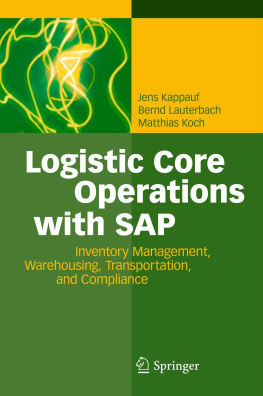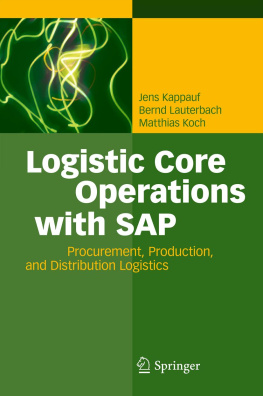Jens Kappauf , Bernd Lauterbach and Matthias Koch Logistic Core Operations with SAP 2012 Inventory Management, Warehousing, Transportation, and Compliance 10.1007/978-3-642-18202-0_1 Springer-Verlag Berlin Heidelberg 2012
1. Introduction
The most imperative challenge facing a number of managers in recent years has been to regain lost market share and secure new competitive advantages. The impetus for this trend continues to be the ubiquitous tendency toward globalization and the ensuing intensification of international competition. Customer orientation , lean management and re-engineering are the buzzwords that characterize these efforts.
In fact, several companies need to reorganize their value-added processes, whereby special attention should be paid to the interfaces between the sales and procurement markets, which are increasing in importance. Within this context, there is hardly a corporate function that has grown in significance in recent years as much as logistics .
Treated until just a few years ago as an operational aid and an object of isolated rationalization efforts, logistics especially in the age of supply chain management now is considered an essential element of strategic corporate leadership. More and more, logistics is being functionally mapped in standard business software. Accordingly, there is great demand for logistical expertise in connection with the know-how surrounding the implementation of logistics in complex information systems.
Definition of supply chain management
Supply chain management (SCM) is the observation and administration of logistical processes along the entire value creation chain, which includes suppliers, customers and end consumers.
1.1 Purpose of This Project
We have divided our presentation of logistics operations with SAP into two volumes. The purpose of them is to provide you with an introduction to the world of logistics with SAP software and assist you in understanding the terminology, concepts and technological components as well as their integration. Because the described processes are complex and include a number of functional details, we have attempted to make the examples as representative as possible in terms of the presentation and functional explanation of the SAP system components, SAP ERP (Enterprise Resource Planning) and SAP SCM (Supply Chain Management). This means that the two volumes cover all components of SAP Business Suite and core functions within the context of logistics. A few components, especially technical ones, and functional areas (e.g. disposal, maintenance and service management) will not be covered.
We have taken care to explain business-related questions and their SAP-specific solutions as well as technical terms, and illustrate their relationships. The books are designed to provide an easily understandable yet well-substantiated look at the respective process chains, and be a useful source of information for everyone from IT experts with only basic knowledge of the business-related issues, to employees in logistics departments who are not yet familiar with SAP terms and applications.
1.2 Whom Do These Books Address?
Logistic Core Operations with SAP cannot answer every query, but we hope to give you the tools with which to ask the right questions and understand the essential issues involved. The contents of this book are thus aimed at the following target groups:
1.2.1 SAP-Beginners
The books are dedicated to everyone looking for a lucid, informed introduction to logistics with SAP. Thus, each chapter describes in detail a specific logistics field and provides an overview of the functionality and applications of the respective components in practical business use. In this regard, we address SAP beginners and employees in departments where SAP is to be implemented, as well as students wishing to obtain an impression of the logistic core processes and their mapping in SAP software.
1.2.2 Ambitious Users
We also speak to ambitious users of SAP Business Suite who, in addition to relevant logistical processes, want a look at process integration and the functions up- or downstream, as well as their mapping in SAP Business Suite.
1.2.3 Managers and IT-Decision-Makers
Last but not least, we turn to management staff and IT decision-makers who are considering the implementation of SAP Business Suite or its individual components and wish to obtain an overview of logistical processes with SAP systems.
1.3 Operational Significance of Logistics
The operational significance of logistics for many companies still lies in its rationalization potential. In general, a reduction of logistics costs should improve corporate success by achieving a competitive advantage. Surveys of businesses have demonstrated that, for the coming years, companies are still counting on a considerable cost-reduction potential of 510% of total costs (see 3PL Study , The State of Logistics Outsourcing 2009, Third-Party Logistics). This statement does not contradict the fact that the share of logistics costs of many companies was more likely to increase in the past because, for instance, it is directly related to which operational processes are included in the logistics process.
Thus, the scope of logistics in recent years has continually expanded, for example to include production planning and control (PPS systems) or quality control. In addition, significant investments are being made in IT technology, in areas such as supply chain management planning. In the near future, this will lead to a decrease in administrative logistics costs (e.g. through shipment tracking, transport organization or Internet-based ordering).
Further savings are expected in commercial and industrial firms by subcontracting logistics services (logistics outsourcing). In particular, operative logistics tasks, such as transport, storage, commissioning and packaging, have already been outsourced to a high degree to external logistics service providers. However, since a lack of quality in logistics services is generally not blamed on the service providers involved, but rather on the supplier, outsourcing logistics functions can be problematic.
1.3.1 Supplementary Logistics Services
When the quality of competitor products continues to become more comparable and there is hardly room to lower prices any further, competition takes place on the level of service performance. Within these services, logistics ranks highly: Delivery dependability, rapid returns processing and a high degree of customer service quality are characteristics with which a company can set itself apart from its competitors.
1.3.2 Customer-Oriented Logistics
Several logistics processes either include interfaces with customers or have effects on the customer. That is why logistics processes must be oriented toward customer needs and performed in a service-friendly manner. In an era when logistics demands are becoming ever more exacting and, by the time the consumer is reached, ever more customized, companies that master these processes to the advantage of their customers will experience a competitive edge that, at least in the short term, cannot be bridged by the competition. Firms boasting excellent logistics management can hardly be replaced by other suppliers. Thus, there are cases in which logistics in commercial and industrial businesses is one of the core competences for which outsourcing should not be considered. This is not to say that the fulfillment of basic logistics functions (e.g. transport or storage) cannot be outsourced, as there are plenty of providers on the market that are capable of taking over the logistics tasks of a previous supplier on a short-term basis without detriment to quality (make-or-buy decision).










![Jens Gustedt [Jens Gustedt] - Modern C](/uploads/posts/book/146099/thumbs/jens-gustedt-jens-gustedt-modern-c.jpg)


